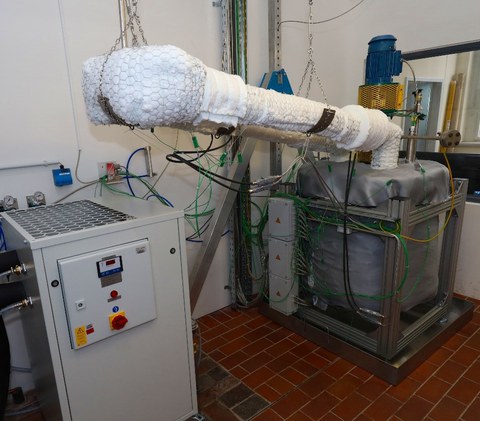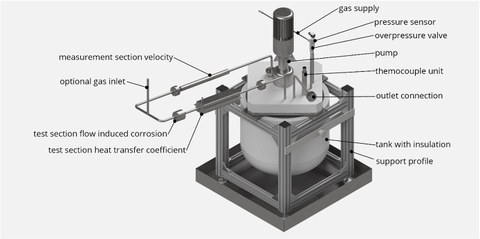COSMOS
Molten salts as heat transfer fluids are increasingly applied for the storage of sensible heat in the high-temperature regime (> 300 °C). Along with the thermal stability, molten salts are available at low investment costs and enable full technological scalability on large-scale storage systems compared to other heat transfer media. As a state-of-the-art storage technology molten salt storages are commercially applied in large-scale concentrated solar power plants (CSP) such as Gemasolar (Spain), Crescent Dunes (USA) and Shouhang Dunhuang (China). Molten salt systems as thermal energy storage are also considered as a key technology for German energy system transition by increasing flexibility of energy grid input and they can contribute to a smart energy system.
The test facility COSMOS (COrrosion and heat Storage test facility for MOlten Salts) consists of a heat storage tank and a molten salt test loop. The setup addresses the investigation of heat input and heat storage capabilities of molten chlorides as well as material resistance to the heat transfer media. The heat storage tanks stocks ~ 200 liters of molten salt. The system heat input is provided by electric wall heaters separated into three different zones with an overall power input of 40 kW. The molten salt can be heated with a constant or variable heat rate up to a maximum medium temperature of 800 °C.
A high-temperature pump in Cantilever-design allows the transport of molten salt in a preheated loop section. This loop section is configured for the conduction of material tests with ceramic and alloy specimens in flow at velocities of 0.5 – 5.0 m/s. An additional section allows the experimental determination of the heat transfer coefficient as a function of media temperature and velocity.

Molten salt test facility COSMOS

Model of test facility COSMOS
| Anlagenbetreuer |
Dr.-Ing. Marion Herrmann |
